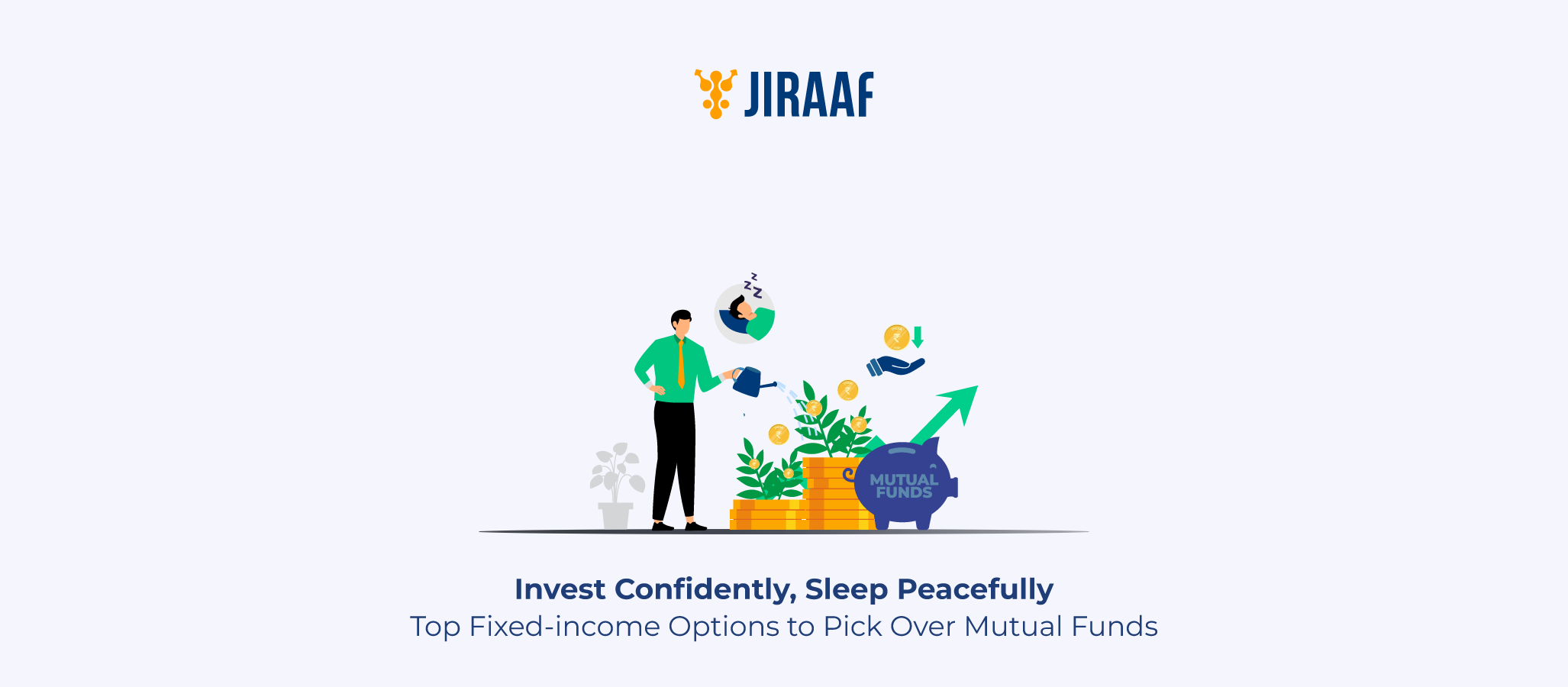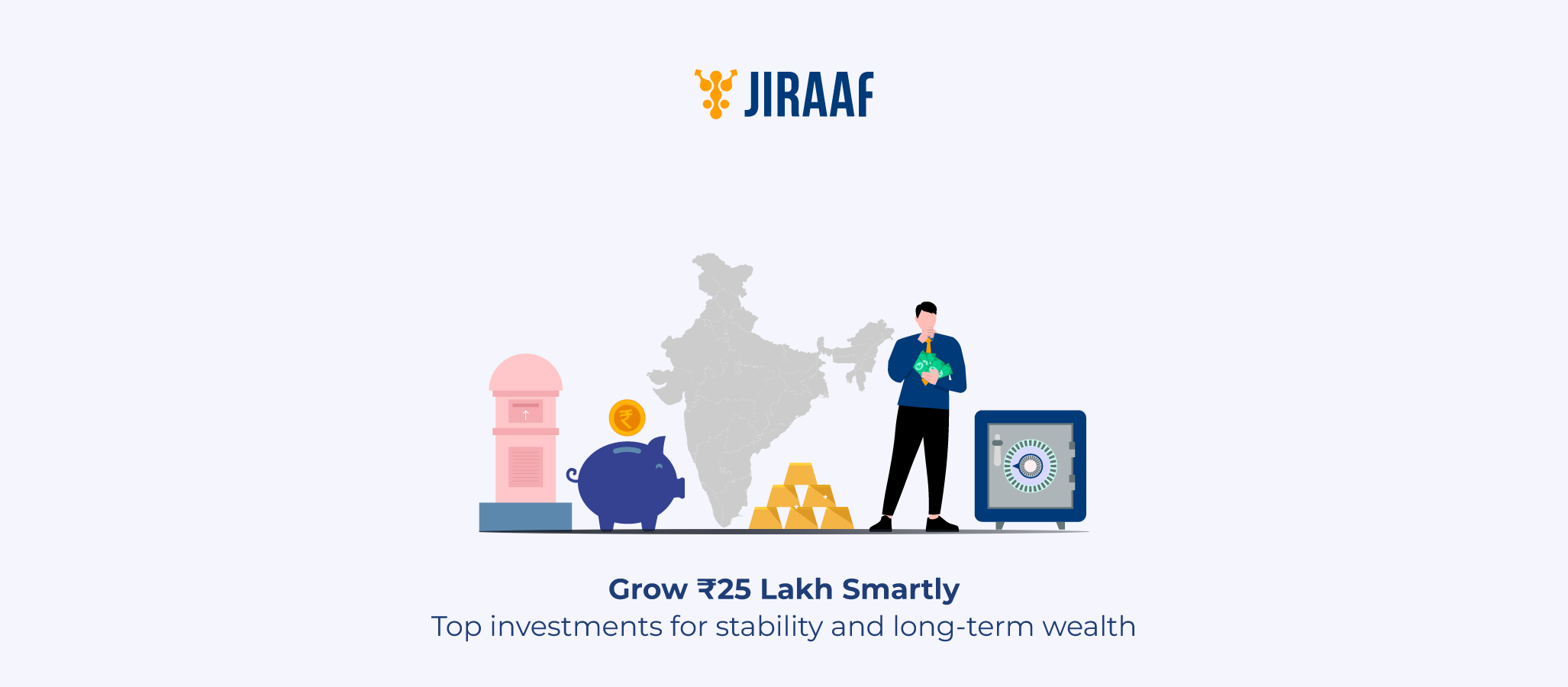Mutual funds have always been popular investments for very simple reasons: they are easy, convenient, and handled by professional fund managers who track the market and make decisions for you.
This makes them useful both for beginners venturing into the market for the first time and for those who don’t have the time or expertise to constantly monitor and adjust their investments. The returns are generally better than what most investors could earn on their own in equity, and above all, they bring a sense of stability.
But, if you want more control of your investments with the same stability and benefits, there are plenty of fixed-income assets that offer the same benefits, but they also address some of the shortcomings of mutual funds. In fact, they can serve as a safer, more predictable route without compromising on reliability.
Why Consider Alternatives to Mutual Funds?
The mutual fund industry in India has grown by leaps and bounds over the years. As per AMFI, the total AUM has grown by 75% in 3 years. It is no surprise that many investors see it as the go-to option. But if you look closely, even with all this growth, mutual funds still miss one key thing, and that is stability. There have been several instances where returns wobbled due to sudden market swings, leaving investors anxious.
On top of that, mutual funds always come with management fees. You are paying professionals to manage your money, which quietly eats into your returns year after year.
Now compare this with fixed income investments. The returns here remain highly stable, often unaffected by short-term market volatility. What is even better is that in recent times, fixed income options have become more competitive, offering attractive interest rates that make them a strong contender.
Another big plus that fixed income gives your portfolio is a solid foundation. It protects your capital while allowing you to confidently explore other asset classes like equities, gold, or even mutual funds themselves. The best part is that they do not involve management fees like mutual funds, but rather a small brokerage charge, making fixed income alternatives in 2025 worth a closer look.
Top Fixed Income Alternatives to Mutual Funds in India
When it comes to investing, safety and predictability never go out of style. Fixed income instruments may not always make headlines like equities or mutual funds, but they quietly deliver stability and a steady flow of returns. Here are 10 of the most reliable fixed-income alternatives to MFs that you can consider in 2025.
Fixed Deposits (FDs)
FDs are the simplest and most widely used fixed-income option. Interest rates generally vary between 2.5% and 7.5% (depending on the bank and tenure) and can go even higher for certain investors, like senior citizens or special schemes.
Some small banks and NBFCs offer FDs with comparatively higher returns, ranging from 7% to 8.5%. Additionally, certain 5-year lock-in FDs provide tax benefits under Section 80C, giving you both steady income and potential savings.
Corporate Bonds
Corporate bonds are ideal if you are willing to take on moderate risk for higher returns. They generally outperform government-backed options, offering yields between 8% and 15%, depending on the credit quality of the issuer.
Government Securities (G-Secs)
When it comes to safety, very few investments can match G-Secs. Backed by the Government of India, they carry negligible default risk, making them one of the most reliable fixed-income choices.
Here, our focus is on government bonds. These come in different maturities, from a few years to as long as 30 years, and generally offer returns in the 6%–7% range, depending on tenure. They are especially attractive for investors seeking predictable long-term income with strong capital protection.
G-Secs also include other instruments like Treasury Bills (T-Bills) for the short term and State Development Loans (SDLs) issued by state governments, which we’ll discuss later in this article.
In short, if stability and trust are what you’re after, government bonds form a rock-solid foundation for your fixed-income portfolio.
National Savings Certificate (NSC)
NSC is easy to open at any post office and currently offers interest around 7.7% per annum, with a fixed 5-year lock-in. The principal qualifies for deductions under Section 80C, making it an attractive option for conservative investors seeking both security and tax benefits.
Public Provident Fund (PPF)
PPF is designed for long-term wealth creation. With a 15-year lock-in and tax-free returns averaging around 7.1% annually (set by the government quarterly), it compounds over time, making it a favorite for risk-averse investors looking to steadily grow their savings.
Senior Citizens’ Savings Scheme (SCSS)
SCSS is tailored for retirees seeking regular income. Offering one of the highest government-backed interest rates at nearly 8.2% annually, it has a 5-year lock-in and pays interest quarterly, helping seniors manage day-to-day expenses comfortably.
RBI Floating Rate Savings Bonds
RBI floating rate bonds reset their interest rates every six months, keeping returns in line with broader market trends. They typically yield over 8% per annum and come with a 7-year lock-in, providing an income stream that adjusts to interest rate changes.
Certificates of Deposit (CDs)
CDs are short-term instruments issued by banks, usually offering rates between 6% and 7.5%. They are ideal for investors seeking better returns than savings accounts without committing to long-term investments.
Securitized Debt Instruments (SDIs)
SDIs include products such as securitized debt instruments, capital protection notes, or credit-linked debentures. They can offer higher returns, sometimes exceeding 10%, but involve greater complexity and risk, making them suitable mainly for experienced investors.
Treasury Bills (T-Bills)
T-Bills are short-term government securities with maturities from 91 to 364 days. Though they provide lower returns of around 5% to 6%, they offer safety and liquidity, making them an excellent option for parking surplus funds.
Fixed income is no longer just about “playing it safe”, it’s about choosing wisely based on your goals, liquidity needs, and risk comfort. Now let’s take it a step further and see how this fixed income alternatives stack up against mutual funds.
Comparing Fixed Income vs Mutual Funds’ Investments
| Feature | Mutual Funds | Fixed Income Alternatives |
| Returns | Can be higher than fixed income but fluctuate with market conditions | Generally stable and predictable, though slightly lower than high-performing funds |
| Risk | Exposed to market volatility; even conservative debt funds can wobble | Low to moderate risk; capital is more protected, especially with government-backed instruments |
| Liquidity | Easy to redeem but exit loads may apply in the short term | Depends on instrument; some are highly liquid (T-Bills, CDs), others have lock-ins (PPF, NSC, SCSS) |
| Management | Actively managed by professionals; fees reduce net returns | Some fixed income options may have nominal charges but they’re generally lower than equity funds |
| Tax Treatment | Capital gains tax applies; debt fund returns taxed as per duration | Interest income taxable under “Income from Other Sources,” but some offer tax benefits (PPF, NSC, SCSS) |
| Predictability | Returns can wobble with interest rate changes, market sentiment | Rates mostly fixed or reset periodically (RBI bonds), providing more predictable cash flow |
| Ideal For | Investors seeking potential growth with moderate risk and hands-off approach | Investors prioritizing stability, regular income, and capital preservation |
Now that we’ve compared mutual funds with fixed income alternatives, the next step is figuring out how to pick the best option that aligns with your goals, risk appetite, and income needs.
How to Choose the Best Alternative Option to Mutual Funds
When you think about investing, mutual funds often come to mind first—they are convenient, professionally managed, and offer decent returns. But they are prone to market swings and come with additional management fees.
For someone seeking stability and a predictable flow of income, fixed income alternatives provide a stronger foundation. They allow you to build your portfolio on a reliable base while still exploring growth opportunities elsewhere.
So how do you approach this wisely? Start by anchoring your portfolio in stability. Government-backed instruments like SCSS, G-Secs, or Post Office schemes provide guaranteed returns and protect your capital, giving you a sense of security that allows you to plan without constant worry.
Next, match your investments to your horizon. Short-term options like Treasury Bills or Certificates of Deposit are great for immediate liquidity, while longer-term choices like PPF or NSC help grow your wealth steadily over the years. Think of this as mapping your cash flows according to your life goals and expenses.
Diversification remains key, even within fixed income. A smart mix of FDs, corporate bonds, and government-backed instruments balances risk and return. This helps ensure that if one instrument underperforms, the others keep your income steady.
It is also important to keep some liquidity. Life throws unexpected expenses at everyone, and having a portion of your portfolio in easily accessible instruments means you don’t have to disrupt long-term plans when emergencies arise.
Taxes and efficiency play a role too. Certain fixed income options, like SCSS, PPF, or NSC, provide tax benefits under Section 80C or offer tax-free returns, which increases your effective earnings. Pairing this with instruments that adjust to changing interest rates, like RBI Floating Rate Bonds, helps your portfolio stay relevant and competitive over time.
Final Thoughts: Balancing Safety and Returns
Fixed income alternatives provide the solid foundation every portfolio needs. They offer stability, predictable returns, and capital protection, allowing you to plan confidently and explore growth opportunities elsewhere.
The right mix depends on your goals, risk appetite, and liquidity needs. Thoughtful diversification and tax efficiency strengthen your portfolio, and consulting a financial advisor ensures your choices are well-aligned and secure for the future. Feel free to explore Jiraaf’s fixed income sources to find options that best suit your needs.









